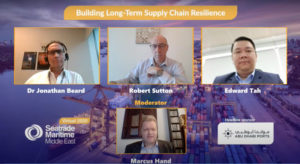The event highlighted the impact of the pandemic on the logistics eco-system and industry professionals
Seatrade Maritime Middle East Virtual 2020 (SMMEV) concluded recently with two sessions featuring a panel of experts from the maritime industry in the Middle East region.

The three-day event provided an ideal platform for knowledge sharing and networking, uniting professionals from the industry globally.
One of the events featured sessions on building a resilient supply chain and adapting to the ‘new normal’, while also tackling the fundamental issue of the physical and mental wellbeing of seafarers. Panellists spoke about the Middle East maritime cluster’s contribution to support the global supply chain and the role of technology in enabling uninterrupted trade flow.
Optimization of operations
The first session that highlighted the impact of the pandemic and the acceleration of digitalization was opened with a keynote speech by Dr. Noura Al Dhaheri, Head of the Digital Cluster, Abu Dhabi Ports and CEO, Maqta Gateway.
“When we consider the World Economic Forum estimates that up to 20 per cent of the US$ 9tn worth of goods shipped annually is spent on administration alone, digital can unlock a new era by changing and modernizing how we do businesses,” she said.
Despite the challenges that cropped up due to the pandemic, ports in the region put up a brave front, tackling the crisis head-on, utilizing the power of digitalization. Technologically-advanced solutions were deployed to keep the supply chain going while also ensuring that the entire eco-system of ports isn’t impacted. Solutions like automation, RPA, documents automation, VR, remote surveys and monitoring helped the industry navigate the challenges seamlessly.
Call for innovation
“2020 is, without doubt, a year of surprises, challenges and opportunities. We believe that the crisis is a trigger for innovation and certainly it has proven to be the case for ADP,” said Robert Sutton, Head of Abu Dhabi Ports’ Logistics Cluster, Abu Dhabi Ports (ADP).
“The pandemic has had a deep and broad-based impact on the economy over a long period. The positive outcome from the pandemic is the adoption of digital activities,” remarked Edward Tah, CEO, Saudi Global Ports.
The seafarer crisis
One of the most impacted groups of maritime professionals during the pandemic were undoubtedly the seafarers. Seafarers around the world faced unprecedented challenges including delayed crew changes, strenuous work hours, at times even being stranded at sea for days. In June, this year the number of stranded seafarers was estimated to be 150,000. By September, it rose to 400,000.
“As an industry, we need to make sure with retention in mind, we do everything we can with hearts and minds to make sure we support our seafarers throughout this process in order to retain them and bring them back when they are rested and ready to go,” stated Matt Dunlop, Group Director HSEQ and Technical, V. Group.
Panellists also spoke about the skills seafarers must be equipped with to work in the post-Covid era, especially due to the rapid increase in automation of ship systems, equipment and operations. Raal Harris, Group Creative Director, Ocean Technologies commented that a combination of skills is required for a modern seafarer, including being digitally savvy, and excellent communication and leadership skills.
Valuable discussions
Over the course of three days, SMMEV 2020 has touched upon pressing concerns in the industry. Discussions included topics ranging from recovery strategies to tackle the pandemic, the market outlook of the energy business, clean energy in shipping, environment and people sustainability, adoption of digitalization and technologically-advanced solutions and more, the press note continued.
Chris Hayman, Chairman, Seatrade, expressed satisfaction with the smooth conduction of the event.

